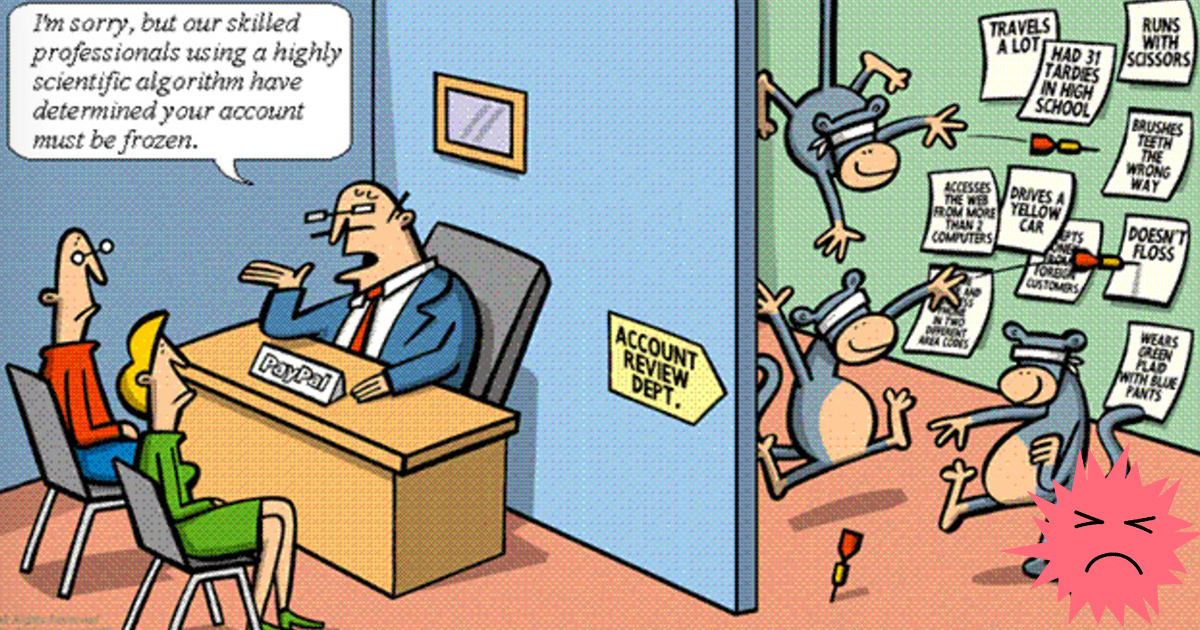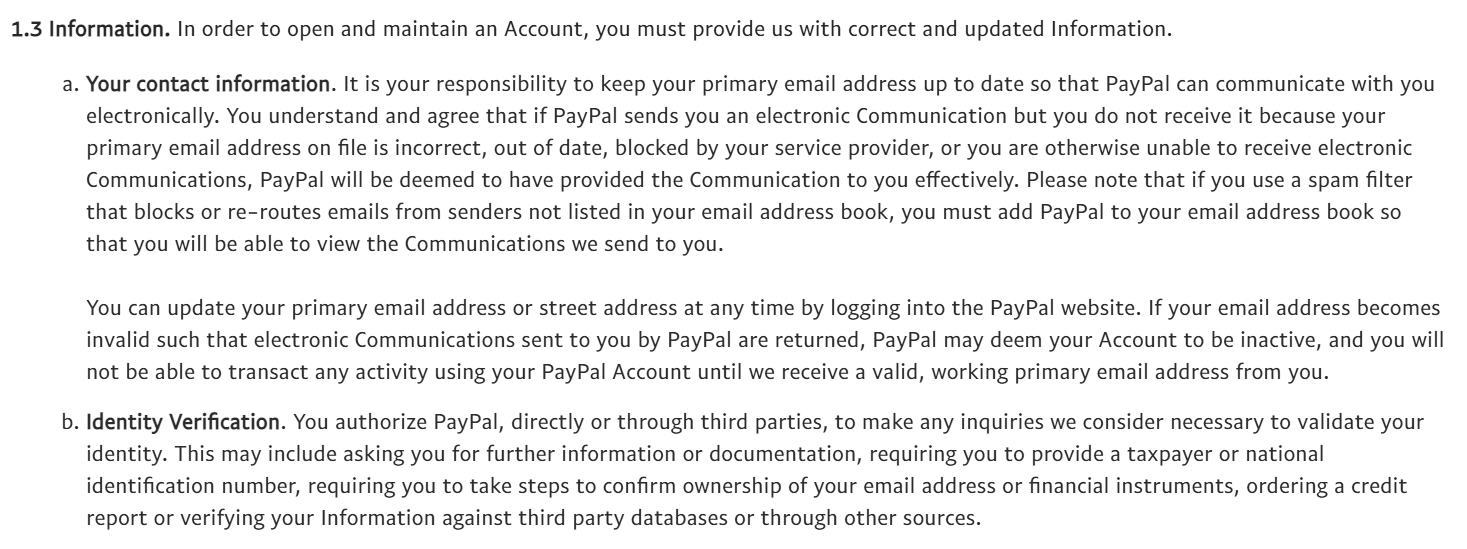
Someone remembers how, in the early 2000s, Sergei Golubitsky on the pages of "Computerra" sandwiched the PayPal payment system for "massive theft of money from customer accounts." The company was founded by Maximilian Levchin, an American millionaire, in a past life - a graduate of the Kiev special mathematical school, who traded in his youth under the hacker nickname Mad Russian (as well as Mad Max, Coffee, mumitroll, DELPH and Plumber - The Plumber).
The genetic nature of business suggests that the founder's personality leaves an indelible mark on the corporate culture. According to Golubitsky, who has lost $ 70 on his account, PayPal's corporate culture is saturated with disrespect for users. This does not mean Americans, but first of all Levchin's former compatriots - Russians and Ukrainians, in whom the company initially sees thieves and swindlers. There is no presumption of innocence in principle.
Already in those years it was clear that PayPal should be used with great care, and it would be better to avoid it altogether. Otherwise, the office will simply block you without explanation, like thousands of other clients over the past twenty years.
Unfortunately, we have seen this from our own experience.
One "fine" day, our paypal account was blocked without explanation. We noticed this only after complaints from customers who could not make a payment using this method.
Representatives of our financial department made several attempts to contact the support of the Russian office and only after a while we learned that the support did not know why the blockage occurred. They reported that this was a decision from the American office - and there is no further information on this. The employee seems to be happy to help, but cannot, because there is no explanation from those who directly initiated the blocking.
Information appeared in our account that the cooperation is over and the funds will be withdrawn to us in 180 days. As a result, for an incomprehensible time we parted with the amount of 150 thousand rubles on the balance sheet (fortunately, funds were withdrawn regularly, the amount could be much larger)
As a result, we spat on their inadequate actions and promptly replaced payment with foreign cards through Yandex.Checkout. The latter has an option - to enable payment from foreign cards, and there you can also connect Wechat payment for the Chinese, who previously made a lot of payments with us just through Paypal.
PayPal doesn't trust you by default
In the 2000s, the money in the accounts of PayPal users was frozen under the fictitious pretext of violating the client agreement, which did not allow CIS citizens to open accounts with PayPal. Restrictions still exist for citizens of Ukraine and Belarus. They are only allowed to use PayPal to send funds.
One gets the impression that the company is gradually phasing out its activities in Russia. From August 1, 2020, she stopped internal transfers... The Russians will still be able to accept payments from abroad and make transfers abroad, but it is no longer possible to transfer money within the country. The company explained its decision by the fact that domestic transfers within Russia accounted for a small part of the total payments of Russian users. Profit from domestic operations accounted for only 4% of the total profit of the Russian division. In this way, some online stores accepted payments and collected donations. Now they have to use alternatives.
For Russian users, the ability to accept payments to the account appeared in October 2011. In September 2013, it became possible to register corporate accounts and accept payments from bank cards with the withdrawal of funds received to an account with a Russian bank.
But there is a possibility that Russians will soon be lowered to the humiliating status that is now assigned to Belarusians and Ukrainians. By allowing them to spend money, but prohibiting them from accepting funds, the company makes it clear that it still considers these people to be potential thieves and scammers. In other words, the system doesn't trust them by default. Russians should not flatter themselves, the attitude towards them is the same - PayPal will easily block your account and freeze money.
The User Agreement User Agreement for PayPal Servicesthere is clause 1.3: "To open and maintain an account, you must provide true and up-to-date information", including identity documents (clause 1.3.b). In other words, if any information provided by you turns out to be inaccurate, inaccurate, inconsistent with the current state of affairs or incomplete, the company has the right to refuse you to use PayPal services:

Bulk account blocking
Sadly, little has changed since Golubitsky. PayPal continues to massively block the accounts of Russian-speaking users. To unblock, you need to send several documents to confirm the identity and address indicated in the registration data. At the same time, the requirements for documents are strict: it must be a utility bill or an agreement with a bank, where your name and surname exactly correspond to those specified during registration.
On the forums they write that in the event of such a blocking, it is easier to forget and create another account. To restore the old chances are almost zero. And after blocking, you cannot immediately withdraw funds: this is possible only after the account is closed after 180 days.
Remember that PayPal is not a financial institution from a legal point of view and therefore is not subject to government regulations that govern banks and financial institutions. This is just a commercial company that makes a profit in all available ways.
The researchers explain that the root problem is that PayPal sees fraud not as a legal issue, but as a risk management issue . The anti-fraud system "Igor" developed by Levchin was named after one of the hackers who deceived her. The system is self-learning and actually works like a black box. Simply put, PayPal itself may not knowwhy your account is blocked. Accordingly, the support service is unable to explain anything to you and cannot help you with anything.
The use of machine learning is really effective: thanks to Igor in 2015, PayPal's fraud rate was only 0.32% of turnover , which is significantly lower than the 1.32% rate for all US retail.
You can be happy about PayPal, but what should ordinary users do in such a situation? It is probably best not to keep significant amounts in your account and withdraw money as often as possible. We will have to accept that mass account blocking without explanation is the genetic nature of PayPal's business.
Advertising
Our company offers servers for rent for any project. A very wide range of tariff plans, the maximum configuration breaks records - 128 CPU cores, 512 GB RAM, 4000 GB NVMe!
